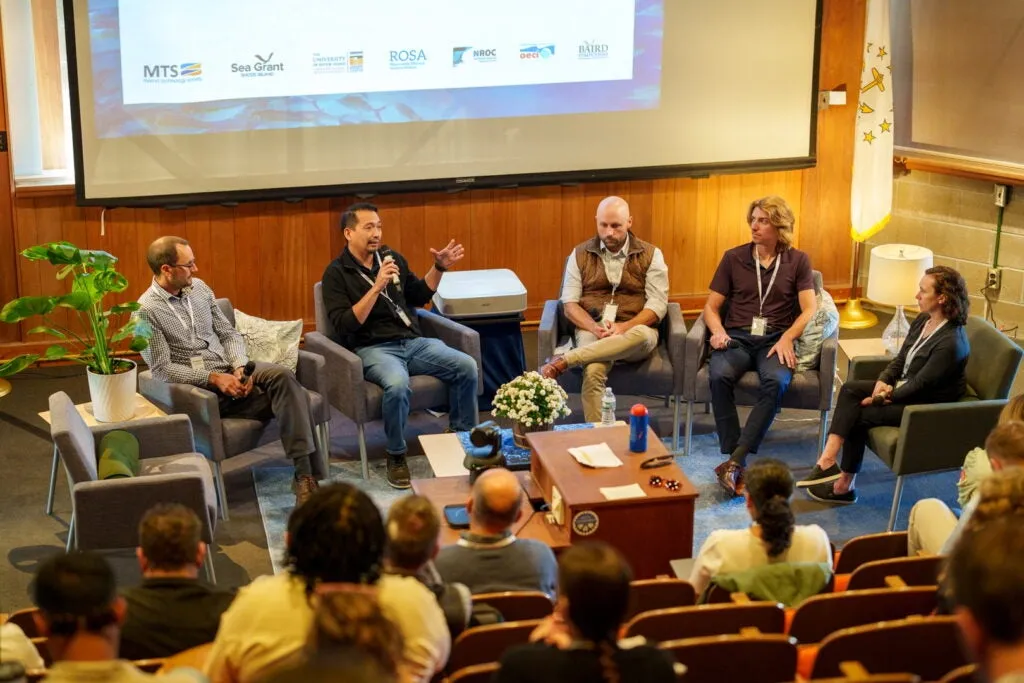The University of Rhode Island’s Narragansett Bay Campus buzzed with energy and innovation as it hosted the Marine Technology Society’s TechSurge international conference. URI President Marc Parlange welcomed attendees, highlighting the institution’s growing investment in ocean technology and workforce development. “We are seeing significant investment in URI, and particularly on the Bay Campus, towards enhancing ocean technology and building its capable workforce,” Parlange said. “This event is certainly an exciting indicator that our collaborative efforts are working, and we are right on track.”
The conference, which focused on fisheries and benthic monitoring for offshore development, was a melting pot of ideas and expertise. Attendees engaged in lectures, workshops, and networking events, while a “Tech Cafe” fostered connections between industry professionals and students. Tours of the Narragansett Bay Campus showcased state-of-the-art ocean technology laboratories and startup businesses that partner with URI, offering a glimpse into the cutting-edge work being done in marine technology.
Graduate School of Oceanography Interim Dean Steven D’Hondt reminded attendees of URI’s pivotal role in advancing offshore wind energy. “URI and Rhode Island Sea Grant played a lead role in marshaling the science that ultimately resulted in the country’s first offshore wind farm, the Block Island Wind Farm,” he noted, underscoring the institution’s commitment to innovation and sustainability.
Rhode Island Sea Grant, in partnership with the Marine Technology Society, brought the conference to URI as the 20th Ronald C. Baird Sea Grant Science Symposium. The event featured several panel discussions, including insights from Christopher Roman, professor of ocean engineering and oceanography at URI; William Misa, fisheries ecologist at TetraTech; Cameron Thompson, pelagic ecologist at Northeastern Regional Association of Coastal Ocean Observing Systems; URI alumnus Nicholas Chaloux, an engineer at Woods Hole Oceanographic Institution; and URI alumna Emily Shumchenia, ocean data scientist for the Northeast Regional Ocean Council.
The Marine Technology Society’s New England chapter, along with its student chapter at URI, played a crucial role in the conference. These chapters provide a platform for industry experts, researchers, and students to develop skills and connections that lead to careers in marine technology and ocean engineering.
Tracey Dalton, director of Rhode Island Sea Grant and a professor in URI’s Department of Marine Affairs, emphasized the importance of science in decision-making. “Rhode Island Sea Grant, as with other Sea Grant programs, is committed to ensuring that the best science informs how coastal communities and states make decisions about marine and ocean resources that are part of our daily life,” she said. “As advances in ocean technology can help us improve how people access, for example, food and jobs tied to marine environments, this event served as a perfect platform for this year’s Baird Symposium.”
Rhode Island Sea Grant is one of 34 programs in the National Sea Grant College Program, dedicated to enhancing environmental stewardship, long-term economic development, and responsible use of coastal and marine resources. The conference at URI’s Narragansett Bay Campus was a testament to the ongoing efforts and collaborations that are shaping the future of marine technology and ocean engineering.

